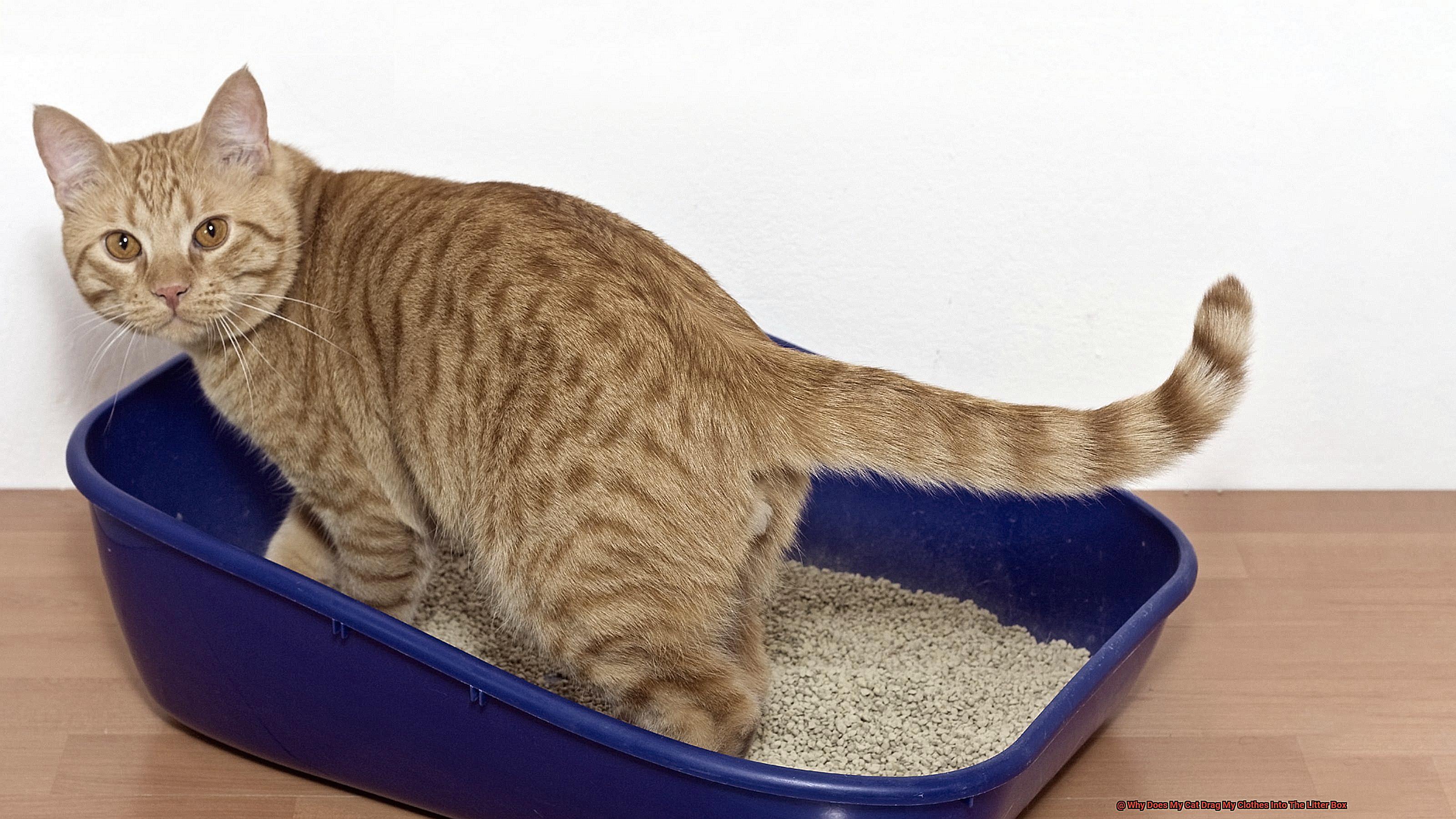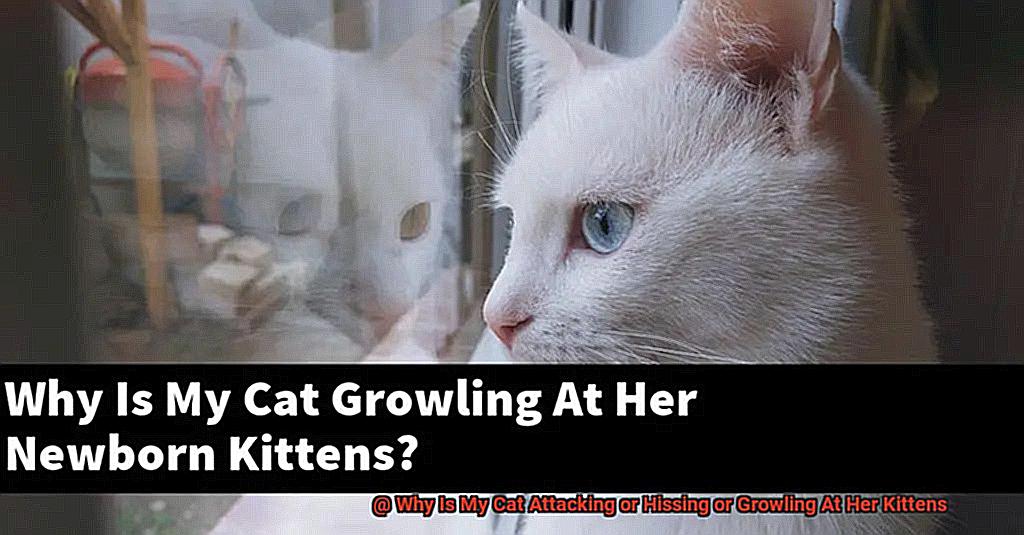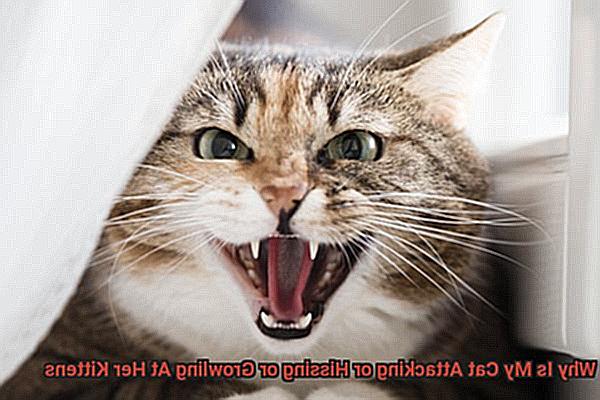As a cat owner, you may have noticed your furry friend behaving aggressively towards her own kittens.
Hissing, growling, and even attacking her own offspring can be alarming to witness. Your first instinct as a pet parent might be to intervene and protect the little ones.
But before taking any action, it’s important to understand why this behavior is happening. A mother cat can exhibit aggressive behavior towards her kittens for various reasons.
For instance, she may be trying to wean them off as they approach the weaning period. Alternatively, she could be ill or afraid and responding through aggression.
It’s essential to note that your cat’s aggressiveness towards her kittens isn’t necessarily a sign of stress or distress. However, it’s crucial to monitor the kittens’ behavior and identify any potential dangers.
In this blog post, we’ll explore why a mother cat may behave aggressively towards her kittens and what steps you can take as a pet owner to resolve the situation. We’ll discuss the tell-tale signs of aggression and offer tips on how to encourage your cat to move away from her aggressive behavior.
So, let’s dive in.
What Causes a Mother Cat to Attack Her Kittens?
While mother cats are generally nurturing and protective of their offspring, there are certain situations where they may exhibit aggressive behavior towards them.
Let’s explore some of the common reasons for this behavior. One possible reason why a mother cat may attack her kittens is due to health issues.
If she senses that one or more of her kittens are sick or weak, she may feel that she is protecting the rest of the litter by attacking them. In the wild, predators often target the weakest members of a group first, so this behavior is instinctual for mother cats.
Another reason for maternal aggression is overcrowding. If a mother cat feels that there are too many kittens in the litter and she cannot provide enough milk or resources for all of them, she may attack or abandon some of them to ensure the survival of the remaining ones.
This behavior is also instinctual and geared towards ensuring the survival of the fittest. Stress can also cause a mother cat to become aggressive towards her kittens.
Loud noises, unfamiliar people or pets in the house, or changes in routine can all contribute to stress in cats. When a mother cat is stressed out, she may lash out at her kittens as a way of coping with her anxiety.
Sometimes, a mother cat may lack strong maternal instincts and not know how to properly care for her kittens. In these cases, she may attack or neglect them without realizing that she is harming them.
This behavior can be corrected through training and socialization with other cats. Lastly, territorial behavior can cause a mother cat to attack her own kittens.
If she perceives that her territory is being threatened by other cats or animals, she may become aggressive towards her kittens to protect them from potential threats. It’s important to remember that every situation is unique and requires a unique approach.
If you observe any concerning behavior from your mother cat towards her kittens, it is essential to seek advice from a veterinarian or animal behaviorist to determine the underlying cause and find an appropriate solution.
Why Do Mother Cats Growl at their Newborn Kittens?
It may seem harsh or scary, but it’s actually a natural behavior that serves a crucial purpose in a mother cat’s parenting style.
The low-pitched and rumbling sound of a mother cat’s growling is a way for her to communicate with her litter. It establishes boundaries and teaches the kittens to respect their mother’s authority, which is important for their socialization and future interactions with other cats.
But that’s not all. Mother cats also growl to protect their young from harm.
They are fiercely protective and will do whatever it takes to keep their kittens safe. The growling sound serves as a warning to potential predators that the mother cat is ready to defend her litter.
Furthermore, mother cats growl at their newborn kittens as a way of teaching them how to survive in the wild. By growling, the mother cat is reminding her kittens to be alert and cautious, which are crucial life skills for their future survival.
While it may seem intimidating or even scary to us humans, growling is an essential part of a mother cat’s parenting style. It helps her establish boundaries, teach her kittens vital life skills, and keep them safe from harm.
As the kittens grow older and become more independent, the growling behavior will naturally decrease until it eventually stops altogether. So if you hear your mother cat growling at her newborn kittens, don’t be concerned.
It’s simply a natural behavior that shows she cares about her litter and wants to prepare them for the world.
Why Do Mother Cats Attack Their Older Kittens?
When it comes to their kittens, mother cats are fiercely protective.
But what happens when they attack their older kittens? It may seem counterintuitive, but there are several reasons why mother cats may resort to such drastic measures.
Firstly, mother cats may use aggression to teach their older kittens important life skills such as hunting and self-defense. A mother cat will gently bite or swat her kittens to guide them in the right direction.
However, if the kittens are too rough or aggressive, she may respond with more forceful attacks to establish boundaries and keep them safe. Secondly, mother cats may attack their older kittens to maintain order within the group.
As the kittens grow older, they may try to challenge their mother’s authority and establish themselves as the dominant cat. In response, the mother cat may become more aggressive and assert her dominance through physical attacks.

This behavior helps keep order and prevent chaos within the family. Lastly, mother cats may harm their older kittens if they perceive them as a threat to their new litter of kittens.
This is especially true if the older kittens are male and sexually mature, as they may try to mate with the new litter or harm them in other ways. In this case, the mother cat will protect her new litter at all costs and may attack or even abandon her older kittens to ensure their safety.
It’s important to note that while mother cats may occasionally attack their older kittens, this behavior is usually not a cause for concern as long as she is not causing serious harm and is providing adequate care and attention. However, if you notice that your mother cat’s aggression towards her kittens is becoming excessive or dangerous, it may be necessary to seek professional help from a veterinarian or animal behaviorist.
What Can Pet Owners Do to Help Their Mother Cat and Kittens?
To ensure their safety and wellbeing, there are several steps you can take.
First and foremost, provide them with a peaceful and comfortable space where they can rest, nurse, and play without any interruptions. This space should be away from other pets or people and should be kept clean and tidy.

Speaking of cleanliness, keeping the living space clean is crucial for their health. Regularly clean any litter, feces, or food scraps, as well as their bedding, toys, and other items they use.
Mother cats need proper nutrition to produce enough milk for their kittens. Make sure to provide high-quality kitten food that is rich in nutrients such as protein, vitamins, and minerals.
And don’t forget to ensure that the mother cat has access to clean water at all times. Monitoring their health is also an essential part of caring for mother cats and their kittens.
Keep an eye out for any signs of illness or distress, such as lethargy, loss of appetite, diarrhea, or vomiting. If you notice any concerning symptoms, don’t hesitate to contact a veterinarian immediately.
Finally, socializing with the kittens from an early age is crucial for their development. Handle them regularly to help them become comfortable with human touch and interaction.
How Can Pet Owners Create a Safe and Comfortable Environment for their Mother Cat and Kittens?

By following these guidelines, you can create a haven for your feline family that will help prevent aggression towards the kittens.
Firstly, it’s important to provide a quiet, private, and secure space for your mother cat and her kittens. Choose a location in your home that is away from loud noises, foot traffic, and other pets.
A relaxed mother cat will be more likely to care for her kittens adequately and bond with them. Secondly, maintaining a clean and hygienic environment is crucial for the health of the mother cat and her kittens.
Clean the litter box regularly, wash their bedding, and ensure the area is free from any potential hazards. A clean environment can also reduce the risk of illnesses.
Thirdly, providing nutritious food and clean water is essential for the mother cat’s wellbeing while she is nursing her kittens. Make sure she has access to balanced meals and fresh water daily.
Fourthly, give them enough space to move around freely. Mother cats need enough space to move comfortably, stretch, and play with their kittens.
Ensure that the area you provide for them is spacious enough for them to move about freely. Lastly, socialization is important for helping your feline family adjust to new situations.
Gradually introduce your mother cat and her kittens to other pets in your household after they have had time to bond with each other. This will help prevent aggression towards other animals.

1XHHyvCr84g” >
Signs of Stress in a Mother Cat and How to Address Them
However, even the most attentive feline mothers can feel overwhelmed and anxious.
It’s essential to recognize the signs of stress in a mother cat and know how to address them to ensure the health and safety of both the mother cat and her kittens. One of the most common signs of stress in a mother cat is when she exhibits aggressive behavior towards her kittens, growling, hissing, or even attacking them.
This behavior could be due to overcrowding, which can cause tension and anxiety for the mother cat. Providing a larger living space or separating the mother cat and her kittens from other cats can help alleviate this stress.
Another potential cause of stress in mother cats is disruptions to their routine or environment, such as moving to a new home or changes in feeding or litter box arrangements. These changes can make a mother cat feel uneasy and anxious.
Maintaining a consistent routine and minimizing disruptions can help reduce stress in these situations. It’s crucial to ensure that the mother cat has access to adequate resources such as food, water, and a clean litter box.
A lack of resources can lead to stress, anxiety, and even aggressive behavior towards her kittens. Ensure that the mother cat has ample support for herself and her children.
Providing a comfortable living space, maintaining a consistent routine, and ensuring adequate resources can all help alleviate stress and promote a healthy environment for both the mother cat and her kittens.
Also Read: Cat Growling After Giving Birth: Is It Normal? – 21Cats.org
Conclusion
In conclusion, understanding why a mother cat may exhibit aggressive behavior towards her kittens is crucial for any cat owner.
It can be alarming to witness growling and attacking behavior from the very cat who gave birth to these adorable balls of fur. However, it’s essential to keep a close eye on the kittens’ behavior and identify any potential dangers.
There are several reasons why a mother cat might display aggression towards her young ones. These include health problems, overcrowding, exhaustion, a lack of maternal instincts, and territorial behavior.
If you notice any concerning behavior from your mother cat towards her kittens, it’s best to seek advice from a veterinarian or animal behavior specialist. Creating a safe and secure environment for your feline family is key to reducing aggression against the kittens.
Ensuring that they have adequate food and playtime without interruptions will help them relax and feel secure. Caring for both mother cats and their kittens is an essential part of being a responsible pet owner.
Remember that every situation is unique and requires a customized approach tailored to the specific needs of your furry family members.







